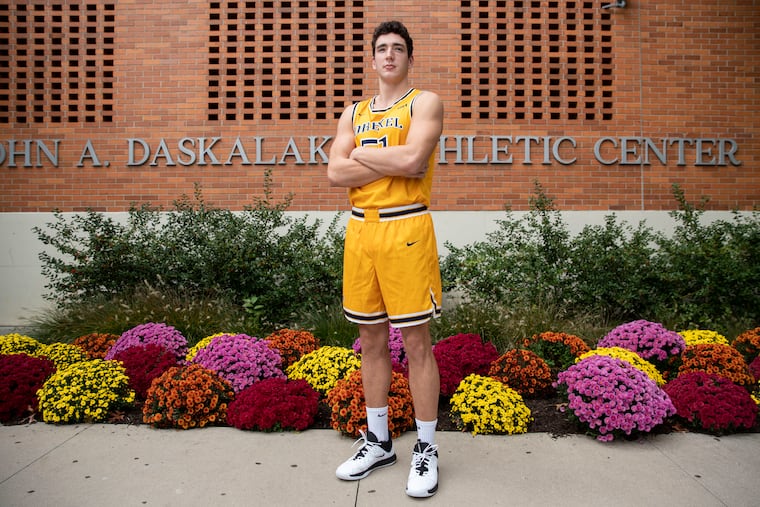For Drexel’s James Butler, rebounding is the family business | City 6 profile
Butler's father is second on Navy’s all-time scoring and rebounding list behind Hall of Famer David Robinson. His sister, Natalie, plays professionally overseas.

One in a series of player profiles previewing the City Six college basketball season.
Like everyone, Drexel basketball star James Butler didn’t find it easy during the pandemic. Trying to work at his craft while home in Virginia, outside in the morning, tough to dribble a ball with dew on the street. With gyms closed, rain, wind, and humidity all became hostile opponents.
If you know anything about James Butler, none of that ended the story.
“We never really skipped a beat,” Butler said.
We?
“I’d go to local parks and play a lot of pickup with my sister, all over Northern Virginia,” Butler said.
James, 6-foot-8, and older sister Natalie, 6-5, almost always played on the same team.
“We show up, there’s a lot of talk,” Butler said. “Nobody knows ... ‘Who are these two?’ A lot of times we won six, seven, eight times straight.”
» READ MORE: Drexel’s Kate Connolly and her path to being a good teammate | City 6 profile
The rest were lucky Dad wasn’t playing, too. Sure, Butler is preseason first-team all-Colonial Athletic Association pick. With two seasons of eligibility left, he still has work to do to move up the family ranks, since father Vern Butler, 6-foot-7, is second on Navy’s all-time scoring and rebounding list, behind only his old teammate David Robinson.
The best rebounder in the family? Natalie has her claim, since she holds the NCAA women’s single-season rebounding record, set at George Mason in 2018.
Natalie plays professionally in Europe, in Greece this season, and she worked inside on her post game in those pickup games. James, who had 11.7 rebounds a game last season, the most by any Drexel player in the last 24 years, wanted to expand his perimeter game after averaging 13.2 points in 2019-20.
“A huge focus, I put a lot of work into it,” Butler said of taking three-pointers and extending his midrange game.
Back to the rebounding, though. How did that become the family specialty? There’s a nature vs. nurture debate here, and you might be tempted to go stronger on the nature side, but understand the knowledge that has been passed down.
“We always want to bring a lot of energy and hustle to the game,” Butler said. “I think that’s the biggest way you can contribute, with your energy, and how hard you play.”
One day last winter, Vern Butler was up in Philadelphia, ready to work in a gym alone with his son after the Drexel women’s team finished its game.
“We always say, when the shot goes up, locate, step in, box out, then once you box out, you’ve got to be able to release and go get the rebound,” Vern Butler said that day. “If you notice a lot of people will box out …”
They’re halfway there …
“But their weight is always shifted on their way, so they can’t release and go get the ball,” Vern Butler said.
At that time, Natalie Butler was playing in Romania. She said in an email she could hear her dad’s voice as she typed what was the most important facet of rebounding, “Go to the ball.”
Natalie also explained how timing is so important, that you have to be at the peak of your jump when you grab the ball.
Dad had his moments, including facing off against the late Len Bias for a state high school championship.
“You’re leaving out a small detail,” James said of his father. “He hit the game-winning shot — over Lenny Bias.”
Playing with David Robinson also was special.
“They’d double-team him and I’d have a field day,” Vern said.
Mom also gets respect in the family best-athlete conversation, since she ran track at Navy, although Natalie actually gives that label to James, “by far.”
“We should talk about your grandfather a little bit,” Vern Butler said, sitting with his son.
“He was an Olympic wrestler, bronze in the ’56 Olympics in Melbourne,” James said. “Mom’s side. He went to Navy as well.”
“I think that’s where he gets some of his natural strength and ability,” Vern said of James.
James transferred to Drexel from Navy after not seeing much time as a freshman at the academy, which is eyebrow-raising after all Butler immediately accomplished at his new school, including leading the CAA in field-goal percentage in 2018-19.
The NCAA granted a waiver, allowing Butler two more years of eligibility, so those four games James played at Navy didn’t count against him.
Butler as a college hoops vet could be interesting. Those summer pickup games didn’t resemble a college basketball game in terms of the structure, he said, but there still was a chance to work on turnaround moves and jump hooks. He’d show up with specific thoughts in mind.
They’d hear about games just from word of mouth, Butler said, but the competition usually was pretty good. Sometimes, they’d run into players he’d faced in high school. But if the court regulars didn’t know this guy or his sister, that was taken care of before they got back in the car.
“We made sure they know who we are,” James Butler said.